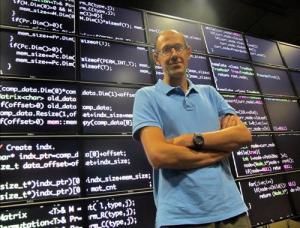The ICES Blog is running a feature this week on Gordon Bell Award Winner George Biros from the University of Texas at Austin. Biros is developing and optimizing algorithms with the potential to be widely applied across different areas of science and engineering. And with a background and appointment as a mechanical engineering professor, Biros is accustomed to addressing a wide range of issues.
We identify what the important problems are and then we try and design the appropriate methods to solve these problems, “ Biros, who leads the ICES Parallel Algorithms for Data Analysis and Simulation Group, said. “And many times we don’t have the algorithms. We have to redesign, or even discover new algorithms that enable the efficient use of HPC systems.”
While inefficient, legacy code is not much of a problem at the desktop level, when becomes so large it requires HPC (petabytes or larger) inefficiency turns into an expensive, time exhaustive problem that can prevent the research of others from progressing.
If you have something that’s not optimal on a single laptop, that’s no big deal, but if you’re on a large national resource [an HPC system], first you’re preventing other researchers from using the machines, and second, you’re wasting taxpayer money,” Biros said. “Efficient computing is about maximizing science per dollar.”
With funding from National Science Foundation (NSF), Department of Energy (DOE), and the Air Force Office of Scientific Research (AFOSR), Biros, along with other members of his group and collaborators from UT and other universities, is looking for efficient programming solutions to what he calls “grand challenge problems,” problems that require HPC resources and affect multiple scientific disciplines.
Read the Full Story.





